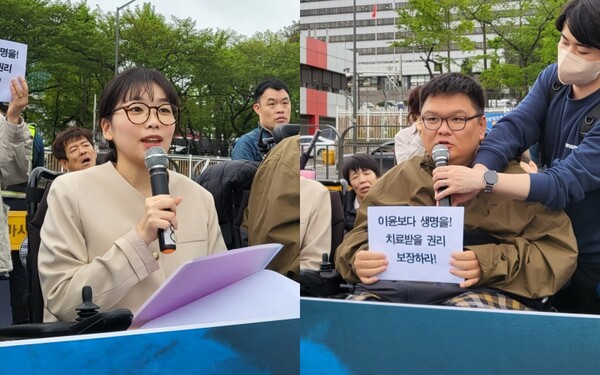A group of spinal muscular atrophy (SMA) patients and the Solidary Against Disability Discrimination (SADD) took to the street Thursday, demanding the improvement of standards for suspending insurance benefits for Spinraza (nusinursen).

After Spinraza received insurance benefits, many SMA patients had high hopes but are frustrated now before a big wall of suspended reimbursement,” said Jung Hye-in, head of the SMA patient group’s task force.
“In the initial stage of the reimbursement, not all SMA patients enjoyed its benefits, but some could receive treatment,” Jung said. “However, even patients who met the conditions and got treatments are failing to pass the screening now because the effect is limited to maintaining the status quo.”
Noting that SMA is a progressive disease and that the condition no longer worsens is meaningful to patients, Jung said she couldn’t hide sorrow watching many patients around her was no longer treated and on the road to regression.
Spinraza was approved to treat patients genetically diagnosed with a defect or mutation in the 5q SMN-1 gene. It has also succeeded in being registered on the reimbursement list in April 2019.
However, the reimbursement standards must meet all the following conditions; the genetic diagnosis of defects or mutations in the 5q SMN-1 gene; the manifestation of SMA-related clinical symptoms and signs under the age of 3; and not using a permanent respirator. Also, if steady treatment progress is not proven even after administration, treatment should be stopped.
“The task force will go all out to make our voices heard to ease reimbursement standards for Spinraza and review the cases of patients whose treatments have been suspended,” Jung said. “We hope the government will help SMA patients to continue to receive treatments.”
Roh Keum-ho, an SMA patient taking Spinraza and vice chair of DADD, complained of difficulties facing patients.
“A year ago, we struggled to improve standards for proving symptoms that occurred before the age of 3. As a result, it is not easy for patients to prove their symptoms after developing an SMA treatment,” Roh said. “We recently heard the welcome news that the Health Insurance Review and Assessment Service (HIRA) would improve age standard, but are also deeply concerned about stories of many patients suspending their treatment.”
The government has pledged to expand the application of health insurance for severe disease treatments but is moving to reduce benefits for them, Roh said. “It is not our fault to become patients. The state should guarantee and protect patients’ rights,” he said.
SADD has been discussing with the government to expand treatment access for people with rare and refractory diseases. It has struggled to secure treatment access for SMA and non-antibody hemophilia patients and formed a task force to deal with rare diseases this month.
In the case of SMA, the solidarity calls for expanding the insurance benefits for Spinraza users, changing reimbursement standards for continuous administration to more realistic levels, and providing insurance coverage for oral treatment, such as Roche’s Evrysdi (risdiplam), too.
“The authorities must expand reimbursement targets and diversify evaluation indexes for receiving treatment with Spinraza,” a solidarity official said. “They must also devise measures for patients who suspended treatments.”
Last year, 147 SMA patients took Spinraza, and 13 were denied administration due to the follow-up monitoring.

